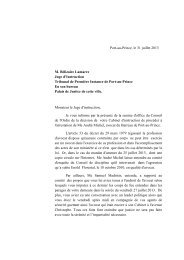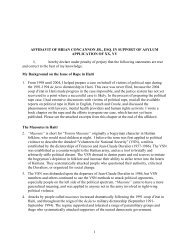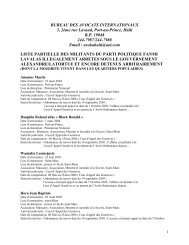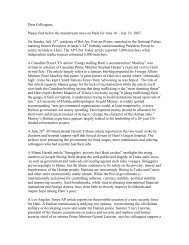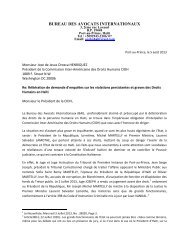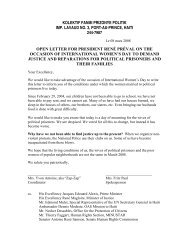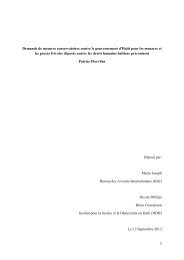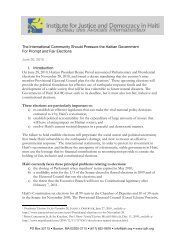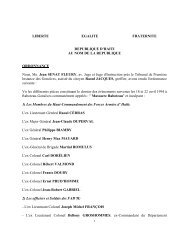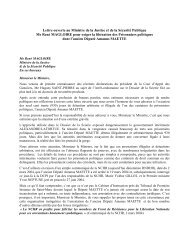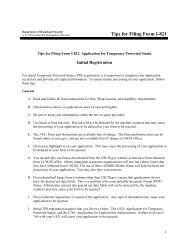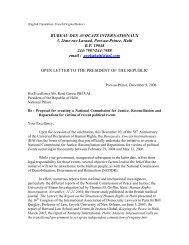Peacekeeping without Accountability - Yale Law School
Peacekeeping without Accountability - Yale Law School
Peacekeeping without Accountability - Yale Law School
- No tags were found...
Create successful ePaper yourself
Turn your PDF publications into a flip-book with our unique Google optimized e-Paper software.
promotion of human rights while simultaneouslyacting in ways that disrespect human rights, thefulfillment of their mandate requires that theiractions be guided by human rights standards.The scope of human rights law that theU.N. must respect is determined in part byHaiti’s international law obligations. The SOFArequires MINUSTAH to “respect all local lawsand regulations” of Haiti. 224 These “local laws andregulations” include any treaty provisions to whichHaiti has committed. 225 As the U.N. is liable for anybreaches by MINUSTAH of its legal obligations, 226 itis responsible for the consequences of MINUSTAH’sfailure to respect Haitian laws and regulations,including its human rights treaty commitments.Moreover, the U.N.’s legal personality alonesuggests that it may be judged according tocustomary international law, including customaryinternational human rights law. 227 The U.N. canbe legally bound to customary international law,defined by the ICJ as “evidence of a general practiceaccepted as law,” 228 or any international humanrights standards that have been similarly widelyaccepted as general principles of law, 229 because theforce of customary international law comes fromits practice, not from its codification in treaties. 230Unlike treaty obligations, which only attach toparties if and when they consent by signing oracceding to the treaty, 231 customary internationallaw obligations are conferred upon any entity thatcan possess international obligations. 232 Givenits legal personality, the U.N. is one such entity,and thus can be legally obligated to comply withcustomary international law. 233Furthermore, if the U.N. fails to comply withinternational human rights law—law that it hashelped to develop, promote, and protect—the U.N.risks losing its moral authority to demand thatstates and other international actors comply withit. One of the U.N.’s primary objectives, expressedin the preamble of its Charter, is to “reaffirm faithin fundamental human rights.” 234 For decades,the U.N. has repeatedly institutionalized itscommitment to the promotion of human rights. 235Further, since its inception, the U.N. has overseenthe development, ratification, and implementationof countless international human rightstreaties and has issues even more resolutions,recommendations, and comments clarifyingand elaborating those legal obligations that areconcomitant with human rights protections. 236Having committed to the global advancement ofinternational human rights, the U.N.’s appeals tostates to respect human rights carry a uniquelyauthoritative force. The U.N.’s refusal to similarlyrespect these rights, however, threatens to sapthese appeals of their authority and legitimacy.C. The U.N. Has Failed to Respect HumanRights in HaitiBy polluting a major Haitian water source withhuman waste contaminated with the cholerabacterium carried by U.N. troops, resulting in thedeaths of thousands and the infection of hundredsof thousands, and subsequently refusing to provideany remedy for the injury its negligence caused,the U.N. has clearly contravened its obligationsunder international law to respect, promote, andprotect human rights. MINUSTAH’s depositing ofcholera-laced human waste into the ArtiboniteRiver failed to respect the victims’ human right towater. The victims’ contraction of cholera from thepolluted river water, and their resultant sicknessand, in many cases, death, stemmed from a failureto respect their human rights to health and life.And the U.N.’s failure to provide any form of redressto its victims for their loss and injury fails torespect their human right to remedy.1. The U.N. Has Failed to Respect the Rightto Water.The U.N. has led the international effort to developand recognize the human right to water. In 2010,the General Assembly adopted a resolution onthe human right to water and sanitation that“recognizes the right to safe and clean drinkingwater and sanitation as a human right that isessential for the full enjoyment of life and all humanrights,” and calls upon international organizations,among others, to provide financial and otherresources to help developing countries expeditetheir efforts “to provide safe, clean, accessible andaffordable drinking water and sanitation for all.” 237The Human Rights Council of the U.N. has also37the u.n. has failed to respect its international human rights obligations



